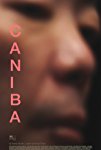Eye For Film >> Movies >> Caniba (2017) Film Review
Caniba
Reviewed by: Jennie Kermode

They say that as one gets older and days of restricted activities become so similar that they escape the memory, the past shines brighter and brighter. For many people, that means dwelling on days when their children were young or they were falling in love. For Issei Sagawa, it means being consumed by memories of the time he murdered a 25 year old woman, engaged in sexual activity with her corpse and then ate parts of it.
For Sagawa, who is consuming something unidentifiable as this film begins, that memory has become a lifeline in more ways than one. For the 31 years since he was released from a secure hospital in Japan (having been deported there from France where the murder took place just five years earlier), his notoriety has been his only means of making a living. This is the fourth feature length documentary in which he has starred; he has also written books about the murder, worked as a food critic (a curious elision here), appeared in cannibal-themed pornography and created a grotesquely exploitative manga, detailing his brutalisation of the promising Sorbonne student, with amateurish felt pen images that recall Patrick Bateman's miserable scribblings in American Psycho. Now in his sixties, debilitated by diabetes and the effects of a stroke, he is desperately trying to eke out the last few yen from the only experience that has ever made him - or anyone else - think he's special.

Lucien Castaing-Taylor and Verena Paravel's documentary, a long way from their exquisitely disturbing Leviathan, seeks to engage through verité but is defeated by its own success in getting intimate with a subject who is utterly banal. The use of extreme close-up, often out of focus, invites us to focus on Sagawa's flesh and virtually press up against him, but unless you are innately phobic about cannibals (in which case, why would you be watching this film?), this isn't a very interesting experience. If you fetishise them, it's practically a cure. As such, it makes an interesting antidote to cinema's frequent fetishisation of the subject, from the gleeful gore of Ravenous to the hammy smugness of Anthony Hopkins' Lecter in The Silence Of The Lambs. The directors' intentions remain obscure; as always, one feels that by watching their work one is becoming a part of the experiment.
Where Caniba becomes most interesting is in its depiction of Sagawa's brother and carer Jun, whose feelings about him seem to range from affection to a sense of duty, from pity to a desire to compete. Not through anthropophagy, which doesn't seem to be his thing, but through the masochism which he seems to see as a central element of his own identity. Images of his self-torture may shock the hypothetical sensitive viewer but to others will be indistinguishable from the hundreds of such videos littering the internet, pleading for attention. The problem here is not the breaking of taboos; it is the absence of anything genuinely remarkable. It is a reminder that, were it not for his persistant and determined publicity seeking, Issei Sagawa would himself be just a 't-shirt of the week' like Kevin Spacey's character in Se7en (or, indeed, like the fallen Kevin Spacey). The law of the west applies: sooner or later, there's always a smarter, taller, better looking monster than you.
Just one question really remains unanswered, and it is, in form, a familiar one. Who will tell the murdered Renée Hartevelt's story? She cannot have had less to say.
Reviewed on: 08 Dec 2017

















